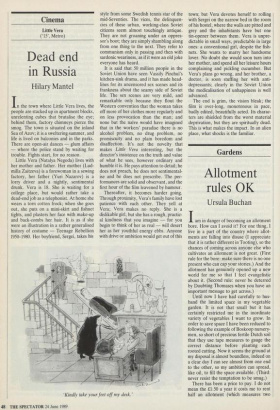Cinema
Dead end in Russia
Hilary Mantel
In the town where Little Vera lives, the people are stacked up in apartment blocks, unrelenting cubes that brutalise the eye; behind them, factory chimneys pierce the smog. The town is situated on the inland Sea of Azov; it is a sweltering summer, and life is lived on balconies and in the parks. There are open-air dances — glum affairs — where the police stand by waiting for trouble. Fights start, for no reason.
Little Vera (Natalya Negoda) lives with her mother and father. Her mother (Lud- milla Zaitzeva) is a forewoman in a sewing factory, her father (Yuri Nazarov) is a lorry driver and a nightly, sentimental drunk. Vera is 18. She is waiting for a college place, but would rather take a dead-end job as a telephonist. At home she wears a torn cotton frock; when she goes out, she puts on a mini-skirt and fishnet tights, and plasters her face with make-up and back-combs her hair. It is as if she were an illustration in a rather generalised history of costume — Teenage Rebellion 1950-1980. Her boyfriend, Sergei, takes his style from some Swedish tennis star of the mid-Seventies. The vices, the delinquen- cies of these urban, working-class Soviet citizens seem almost touchingly antique. They are not groaning under an oppres- sor's boot; they are simply shambling along from one thing to the next. They refer to communism only in passing and then with sardonic weariness, as if it were an old joke everyone has heard.
It is said that 50 million people in the Soviet Union have seen Vassily Pinchul's kitchen-sink drama, and it has made head- lines for its uncensored sex scenes and its frankness about the seamy side of Soviet life. The sex scenes are very mild, and remarkable only because they flout the Western convention that the woman takes off more of her clothes more regularly and on less provocation than the man; and none but the naïve would have imagined that in the workers' paradise there is no alcohol problem, no drug problem, no promiscuity and no plain boredom and disaffection. It's not the novelty that makes Little Vera interesting, but the director's insistence on the truth and value of what he sees, however ordinary and humble it is. He pays attention to detail; he does not preach, he does not sentimental- ise and he does not prescribe. The per- formances are solid and observant, and the first hour of the film leavened by humour.
Thereafter, it becomes harder going. Through proximity, Vera's family have lost patience with each other. They yell at Vera; Vera makes no reply. She is a dislikable girl, but she has a rough, practic- al kindness that you imagine — for you begin to think of her as real — will desert her as her youthful energy ebbs. Anyone with drive or ambition would get out of this `Kindly take your feet off my desk.' town; but Vera devotes herself to rolling with Sergei on the narrow bed in the room of his hostel, where the walls are pitted and grey and the inhabitants have but one tin-opener between them. Vera is unpre- dictable in small ways, predictable in large ones: a conventional girl, despite the fish- nets. She wants to marry her handsome lover. No doubt she would soon turn into her mother, and spend all her leisure hours complaining and pickling cucumber. But Vera's plans go wrong, and her brother, a doctor, is soon stuffing her with anti- depressants; clearly in the Soviet Union the medicalisation of unhappiness is well advanced.
The end is grim, the vision bleak; the film is over-long, monotonous in pace, badly edited, beautifully acted. Its charac- ters are shielded from the worst material deprivation, but they are spiritually dead. This is what makes the impact. In an alien place, what shocks is the familiar.










































































 Previous page
Previous page